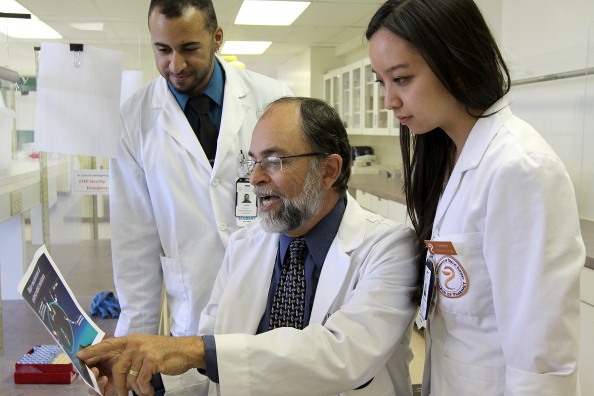By Laura L. Acosta
UTEP News Service
The overuse of antibiotics to treat minor infections is causing certain types of bacteria to become highly resistant to conventional treatment.
Carbapenem-resistant enterobacteriaceae (CRE), or “superbugs,” cause pneumonia, bloodstream infections, wound or surgical site infections, and meningitis in health care settings and can be deadly for 50 percent of patients who become infected, according to a recent announcement by the Centers for Disease Control and Prevention.
José O Rivera, Pharm.D., UTEP Cooperative Pharmacy Program director since 2001, is an infectious disease pharmacotherapy expert whose extensive research includes critical care and antibiotic therapy. In his 30-year career, he has been involved in 15 clinical drug trials with pharmaceutical companies, hospitals, universities and health care organizations to test the effectiveness of new drugs. His latest trial is testing a drug that may potentially treat CRE.
“There is so much overuse of antibiotics and not only in hospitals but even in ambulatory settings,” Rivera said. “Many times antibiotics are prescribed for somebody that doesn’t have an infection and what you’re doing is increasing the exposure for the bacteria to learn how to become resistant. You have a more difficult time treating these types of bacterial infections.”
Rivera is co-principal investigator of a final-stage drug trial with Texas Tech University Health Sciences Center at El Paso (TTUHSC-El Paso) that is supported by a drug company. The trial will assess the effectiveness and safety of a medication that may treat drug-resistant bacterial infections in hospitals and outpatient clinics.
“We have an increase in resistance to gram-negative bacteria and basically there is nothing new in the pipeline to treat these multi-drug resistant organisms,” said Rivera, who has joint appointments with TTUHSC-El Paso, UT Austin and University Medical Center. “So it becomes critical that we come up with new ways of treating these infections.”
For Rivera, drug trials are an opportunity to gain firsthand knowledge about drugs that are not yet on the market but will one day benefit patients. They also enable his students in the UTEP Cooperative Pharmacy Program to participate in a clinical trial and gain hands-on experience.
In the six-year pharmacy program, students enroll at UTEP the first two years, spend two years at UT Austin, and finish at UTEP. Students who successfully complete the program receive a doctorate in pharmacy. The program is expected to graduate its 100th student in May.
Julian McCreary and Catherine Ho are in their final semester of the program. They are assisting Rivera in the drug trial by assessing emergency room patients who may be eligible to participate and then notifying the research coordinator to further evaluate the patients to see if they meet the requirements to enroll.
“Though the part I play is relatively small, I do have the opportunity to gain some insight as to how a drug trial is run and what it takes to get a new drug to market,” McCreary said.
McCreary and Ho are the first pharmacy students to participate in an emergency room rotation in El Paso.
Their preceptorship at University Medical Center gives them ample opportunity to recruit patients for the trial, but it also exposes them to situations that they might never see in other health care settings, such as traumas, emergency codes and poisonings that require pharmacological assistance.
While the emergency room can be an intense place, Ho said that on a less exciting day, she and McCreary do medication reconciliation for patients who come in and discharge counseling for patients who have been given new prescriptions.
But one eventful day this semester, the future pharmacists helped nurses provide life-saving support to an elderly patient who needed CPR.
While the two students stood by observing, nurses asked them if they were CPR certified. McCreary said yes, put on gloves and helped the nurses with chest compressions.
“You get to see a lot of things that you wouldn’t see in other pharmacy rotations,” McCreary said.
On past rotations, McCreary and Ho also have had the opportunity to go on rounds with doctors while they see patients in the hospital.
Last year, McCreary went on rounds with Rivera and Alan H. Tyroch, M.D., chair of the Department of Surgery at TTUHSC-El Paso and trauma medical director at University Medical Center, on a critical care rotation.
Tyroch said having students on his rounds is a learning experience not only for the students, but also for him.
“It’s a great experience for students because we are a Level 1 trauma center, so students get great exposure,” Tyroch said. “And I think I actually get more out of it than (Rivera’s) students do because I’m learning from the students. I’ll ask some question and it forces them to get on their PalmPilot and look the drugs up and tell me what the side effects are, so they’re learning and I’m learning because there are so many new medications out there.”
Rivera has collaborated with Tyroch on four drug trials in the past eight years. Rivera said all trials require investigators to adhere to strict protocols and follow the requirements set by the institutional review board and the Health Insurance Portability and Accountability Act (HIPAA). He provides in-service training for nurses, physicians, surgeons, residents and pharmacy and laboratory personnel who may be involved.
While the current trial may result in a new drug to treat gram-negative bacteria, Rivera said doctors and patients have to be more conscious about using antibiotics by knowing when to use them and when to wait; otherwise, the same problems with antimicrobial resistant bacteria will reoccur.
“It’s a never-ending battle with infectious diseases when organisms find ways to become resistant and it’s very difficult to overcome,” he said.
For information about the Cooperative Pharmacy Program, visit http://chs.utep.edu/cpp/.
